News
Drugs in the lap of luxury
Foreign drug traffickers are increasingly using luxury apartments as ‘safe houses’ to store large quantities of heroin, moving their operations from one apartment to another every few months to avoid detection, a senior officer at the Police Narcotics Bureau (PNB) revealed.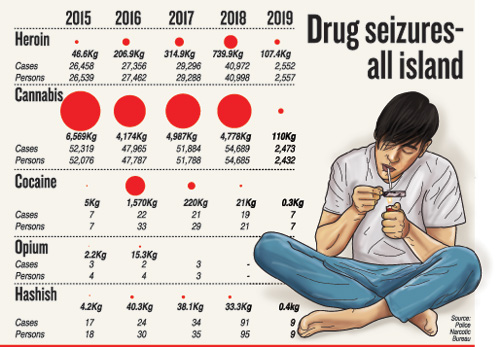
Compared to individual houses, such luxury apartments are advantages to foreign traffickers, said Deputy Inspector General (DIG) Sajeewa Medawatte in charge of the PNB.
The apartments are far more secure as most blocks have security guards, meaning they aren’t as easily accessible as individual houses. They also offer more privacy for traffickers to conduct their operations, the officer pointed out.
As such, foreign traffickers are more than willing to spend enormous amounts of money to rent luxury apartments, but are also careful to move their operations to a different apartment every 3-6 months, the PNB has found.
PNB investigations have established that foreign heroin traffickers who set up operations here do not have any links with each other. “Each group operates separately, but establish connections with local drug dealers through various contacts,” DIG Medawatte explained. Many of these local drug dealers operate from prison and once they establish contact with the foreign traffickers, they proceed to buy heroin from the foreigners. The foreign groups thus work as suppliers to local dealers. “This is what we call a transnational crime,” the DIG added.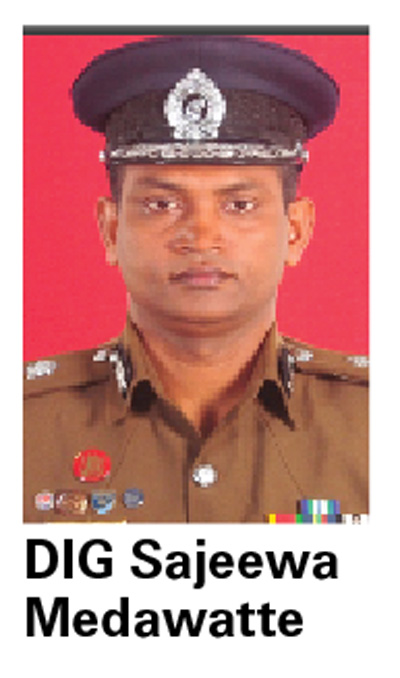
Last Tuesday (22), a joint operation mounted by the PNB and the Special Task Force (STF) in Kollupitiya resulted in the arrest of five individuals, including three foreigners along with more than 95 kilograms of heroin. Much of the heroin was seized from an apartment in a luxury apartment complex in the area, which the foreign traffickers had used as a safe house and base of operations.
The PNB and STF had first arrested a 29-year-old US national near the entrance to a shopping complex in Kollupitiya along with 1.62 kilograms of heroin. Two local men from Hikkaduwa, aged 39 and 42, who had allegedly come to purchase the drugs, were also arrested. A search of the US national revealed a key marked with the name of a luxury apartment complex along Galle Road in the Kollupitiya area. After questioning the suspects, police had gone along with them to the apartment and found another US national as well as an Afghan national inside. A search of four large traveling bags in the apartment revealed 95 kilograms of heroin packed neatly into 92 parcels. The two foreigners who were found in the apartment, both aged 45, were then arrested. Police also recovered other items including mobile phones, several laptops and an ipad from the suspects.
Police estimated the seized heroin to have a street value of over Rs.1.1 billion.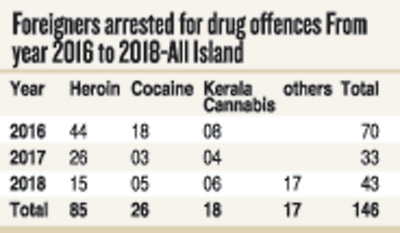
DIG Medawatte said the authorities had been tipped-off about the foreign traffickers and that they had been under surveillance for nearly a week.
“We waited some time to move in as we wanted to find who the local contacts of the foreign traffickers were,” he revealed, adding that the two locals who were arrested were working for a local dealer. The main local suspects have now been identified and investigations are ongoing to arrest them.
The large stashes of heroin that have been recovered in the country in recent years have all been intended for sale in Sri Lanka, according to the PNB. When they busted a heroin racket operated by Bangladeshi nationals in Dehiwala only a few weeks ago, officers found 278 kilograms of heroin, making it the single biggest heroin seizure in the country’s history. A search of the drugs revealed that a significant number of the heroin packs were old, suggesting that they had been smuggled in some time ago. In this instance, too, the Bangladeshi nationals were using a luxury apartment in Mount Lavinia as a base of operations, though they used a house in Dehiwala to store most of the drugs.
“Nearly 90 percent of the heroin that’s being smuggled into the country come via sea and are mainly from Afghanistan and Pakistan. We suspect foreign traffickers are smuggling in a large quantity on a single occasion, and are then storing them in safe houses. They then sell these drugs in small quantities to local dealers,” DIG Medawatte elaborated.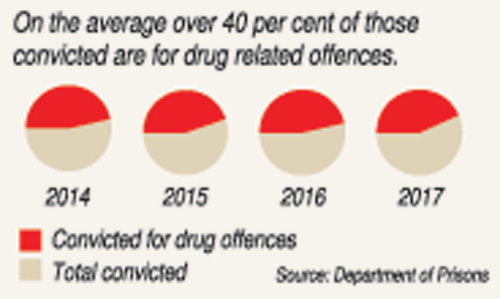
The majority of the heroin that authorities seized from foreign traffickers are between 85 to 90 percent pure. Local buyers only buy small quantities of the high purity heroin and then mix them together with other drugs or substances to make a much larger batch, law enforcement officials have found. As a result, much of the heroin being sold on the streets is only about 15 percent pure.
Authorities seized about 700 kilograms of heroin last year. Given the practice of dealers to mix various substances to vastly increase the heroin amount, the PNB estimates that this is equivalent to between 5000 to 6000 kilograms of the drug being removed from the streets. “One can assume that taking these drugs off the streets has prevented many other crimes linked to the drug trade and drug addiction,” DIG Medawatte pointed out.
According to the DIG, large quantities of heroin have been seized in recent years due to a combination of factors, the main being the strengthening of intelligence gathering on the direction of the Inspector General of Police (IGP), and coordination among different law enforcement agencies and other state arms. “In the past, the PNB mostly operated on its own. However, we are now working closely with other agencies such as the STF, the Organised Crimes Division, the Sri Lanka Navy and the Attorney General’s Department.”
He also noted that some operations take as many as six months to execute. Officers have to wait patiently and monitor suspects before they take action. It takes much time, dedication and teamwork, he pointed out.
The biggest challenge at the moment in anti-drug enforcement efforts is preventing drugs being smuggled into the country by sea – an extremely difficult task as Sri Lanka is an island. In an effort to minimise the ability of smugglers to land large stocks of drugs on the island’s coastline, the PNB has now started establishing branches along the coast. Accordingly, PNB units are now positioned in Jaffna, Arugam Bay, Galle, Mannar and Puttalam.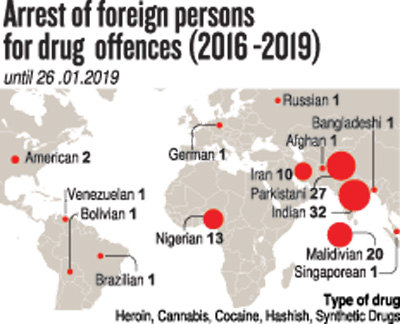
Nevertheless, the lack of a proper monitoring mechanism to track fishing vessels operating from the country’s coast are a problem for authorities.
There are an estimated 7000 multi-day fishing trawlers in the country, along with more than 16, 000 smaller craft, according to police. Large quantities of drugs are transferred to such vessels by other craft in international waters. These drugs are then unloaded onto small dinghies, which are too numerous and virtually impossible to track. Most of the drugs are brought ashore in this way, police explained.
In order to navigate this problem, authorities are now exploring the possibility of establishing a real-time monitoring mechanism to track fishing vessels without hindering the fishermen from carrying out their work, DIG Medawatte stated.
More measures will also be taken to crack down on drug dealers carrying out drug deals from within prison. This is another key area to eradicate the drug menace as it is such dealers who organise the transport of narcotics at ground level, he further said.
| Indians the largest number of foreigners arrested for drug offences | |
| Most of the foreigners who have been arrested for drug offences in the country over the past few years have been taken into custody for heroin possession, statistics released by police show. According to the PNB, 85 out of 146 foreigners arrested for drug offences since 2016 have been arrested for heroin possession. Of the 43 foreigners arrested last year for drug offences, 15 were arrested for heroin possession. Indians make up the largest number of foreigners arrested for drug offences with 32 arrests for possession of various drugs including heroin. Pakistanis come next with 27 arrests while 20 Maldivians have also been arrested. Meanwhile, the Ministry of Justice and Prison Reforms noted that the Ministry has forwarded a list of the names of 48 individuals who had been sentenced to death for drug offences to the Presidential Secretariat since the announcement by President Maithripala Sirisena of his intention to implement capital punishment on death row inmates who have been engaging in drug trafficking from within prison. The Ministry notes that 30 of these 48 individuals have appealed their death sentences and their appeals are pending in court. Three names out of those who had exhausted their appeals have been identified as inmates whose death sentences can be carried out, according to the ministry. |

The drugs found in the luxury apartment in Kollupitiya
| Awareness programmes stepped up | |
| Educating the public, including, schoolchildren on the drug menace and drug prevention was the special focus of the ‘National Drug Prevention Week’ was launched by the Government. A weeklong programme that began on January 21 ends tomorrow. The Inauguration ceremony on Monday was held under the patronage of President Maithripala Sirisena at the Mulliyawalai Vidyananda Vidyalaya in Mullaitivu. 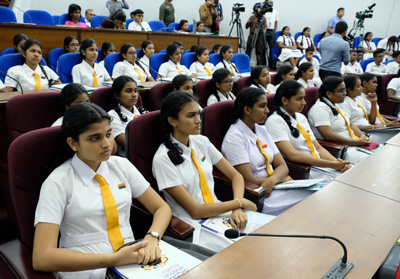 The seminar held by the Govt. Information Dept. Pic by Amila Gamage During the ceremony, authorities also launched a toll-free telephone hotline, ‘1984’ for members of the public to report acts of drug smuggling and related crimes. Drug prevention programmes centered on religious places and Dhamma schools too will be held today (27) as part of these efforts. The Government Information Department also hosted a seminar on Friday, on drug prevention for schoolstudents, officials from the Presidential Secretariat, Health Ministry and journalists . Addressing the gathering, President’s Secretary Udaya R. Seneviratne observed that while the drug menace was mostly concentrated in urban centres in the past, it has now spread to rural areas as well. “Laws alone will not be enough to overcome this menace. Everyone has a responsibility to ensure that their loved ones do not fall prey to drugs,” he stressed. Earlier, addressing journalists at a special media briefing, Dr Samantha Kumara Kithalawaarachchi, Director of the Presidential Task Force on Drug Prevention, noted that the main targets of the national drug prevention programme were to reduce the production, transport and sale of illegal drugs by 80 percent by 2020 in comparison to 2014. The programme also aims to reduce individual alcohol consumption by 25 percent and consumption of tobacco products by 50 percent. In order to curb the spread of illegal drugs, the focus will be on three key areas, namely drafting policies and legislation, enforcing the law and carrying out raids; treatment and rehabilitation; and prevention, he explained. As part of these efforts, since 2015 up until 2018, Drug Prevention Committees have been established in all 25 districts, 331 divisional drug prevention committees, and 14, 022 village level drug prevention committees, it was also pointed out. |

